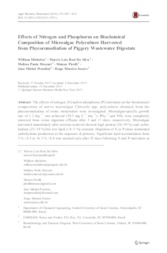Effects of nitrogen and phosphorus on biochemical composition of microalgae polyculture harvested from phycoremediation of piggery wastewater digestate.
Effects of nitrogen and phosphorus on biochemical composition of microalgae polyculture harvested from phycoremediation of piggery wastewater digestate.
Author(s): MICHELON, W.; SILVA, M. L. B. da; MEZZARI, M. P.; PIROLLI, M.; PRANDINI, J. M.; SOARES, H. M.
Summary: Abstract: The effects of nitrogen (N) and/or phosphorus (P) starvation on the biochemical composition of native microalgae Chlorella spp. polyculture obtained from the phycoremediation of swine wastewaters were investigated. Microalgae-specific growth rate of 1.2 day(-1) was achieved (30.3 mg L(-1) day(-1)). PO4 (-2) and NH3 were completely removed from swine digestate effluent after 3 and 11 days, respectively. Microalgae harvested immediately after nutrient removal showed high protein (56-59 %) and carbohydrate (25-34 %) but low lipid (1.8-3 %) contents. Depletion of N or P alone stimulated carbohydrate production at the expenses of proteins. Significant lipid accumulation from 3 % ± 0.5 to 16.3 % ± 0.8 was reached only after 25 days following N and P starvation as demonstrated by Nile red-stained cells. Regarding to the effects of harvesting methods on cellular biochemical composition, circumstantial evidences indicate that coagulation-flocculation with tannin may lead to lower protein and lipid amounts but increased carbohydrate content (p < 0.01) as compared to centrifugation.
Publication year: 2016
Types of publication: Journal article
Unit: Embrapa Swine & Poultry
Keywords: Carbohydrates, Lipids, Microalga, Microalgae, Phycoremediation, Suíno, Swine wastewater, Águas Residuais
Observation
Some of Embrapa's publications are published as ePub files. To read them, use or download one of the following free software options to your computer or mobile device. Android: Google Play Books; IOS: iBooks; Windows and Linux: Calibre.
Access other publications
Access the Agricultural Research Database (BDPA) to consult Embrapa's full library collection and records.
Visit Embrapa Bookstore to purchase books and other publications sold by Embrapa.

